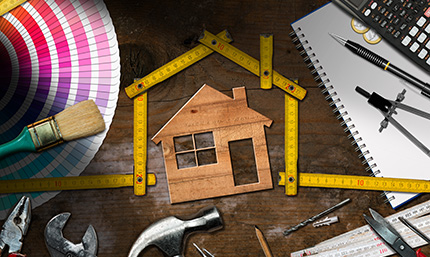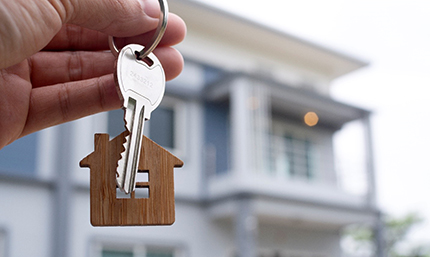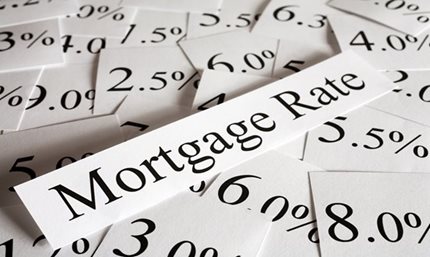News & Tips
The Ultimate Guide to FHA Loans

Home loans are the key to turning a house you love into a home that belongs to you. As you’re exploring your options, you may stumble across FHA loans and wonder what they entail and if one’s right for you. FHA loans have many different benefits and are targeted at helping both new home buyers achieve the dream of home ownership and those looking to refinance.
Through the Federal Housing Administration’s (FHA) programs, borrowers can work with approved lenders, such as credit unions and banks, to get an FHA-insured mortgage. In this FHA Mortgage Guide, we’ll cover everything you need to know about the different programs associated with FHA loans and all the items to check off your list as you explore your options.
Understanding How an FHA Loan Works
An FHA loan is a mortgage that has the added benefit of being insured by the Federal Housing Administration. The FHA doesn’t actually issue mortgages, but they provide insurance so that FHA-approved lenders can have greater confidence in extending these types of loans.
FHA-approved lenders, like credit unions and traditional banks, use these types of loans to help lower- and moderate-income households, first-time homebuyers, and those who may not have perfect credit get into the home of their dreams.
With the backing of FHA insurance, FHA loans become less risky for financial institutions to issue to borrowers. And with the specific requirements and set-up process for FHA loan programs, borrowers don’t typically have to put down as much money up front in the form of a down payment. Helping to save money and still getting to experience all the benefits of homeownership are key attributes of the many available FHA loan programs.
Since FHA loans are actually issued by FHA-approved credit unions and other lending institutions, these entities are the ones who will assess how well-suited applicants are for the program. At Space Coast Credit Union, our mortgage loan officers take the time to fully understand our borrowers’ financial situations and can help recommend the best FHA loan vehicle for their unique circumstances.
What’s the Difference Between FHA and Conventional Mortgages?
It’s common to assume that FHA loans are only for first-time homebuyers and that conventional loans are only for those that have owned property before. However, this is not always the case. FHA loans carry many benefits that can apply to many different groups of borrowers. While specific requirements will vary depending on the lender’s criteria and borrower’s situation, a few of the key differences you’ll see between FHA and conventional mortgages include:
- FHA Loans Require Lower Down Payments: FHA-insured loans allow borrowers to put as little as 3.5 percent down. There are conventional loans that have low down payment options as well, but these are typically for special circumstances. FHA loans also allow for gifts and other alternative funds to be used towards the down payment.
- FHA Borrowers May Qualify with Lower Credit Scores: FHA mortgage loans are generally easier than conventional mortgages to qualify for. Borrowers with a credit score of 580 and above are usually eligible to apply for the lowest down payment options although those with lower credit scores may still qualify for variations of FHA loans. Depending on the lender, conventional loans will require a higher credit score at least in the mid to upper 600s to qualify for most programs. Lower credit scores for conventional loans will translate into higher interest rates in most cases.
- Higher Debt-to-Income Ratios Can Still Qualify for FHA Mortgages: With FHA loans, borrowers can have higher debt-to-income ratios and still qualify. Debt-to-income is a ratio of income versus all of your necessary expenses such as the mortgage, utilities, credit cards, etc. Most financial managers recommend not exceeding a debt-to-income ratio of 35 percent but even if a borrower is higher than this, they can still qualify. At present, the FHA requires borrowers to have a 50 percent or less debt-to-income ratio.
The most important aspect of securing a mortgage is getting one that’s right for you and your financial situation. Our loan officers are trained professionals that dig into the details to help uncover the best path for your unique circumstances.
Different Property Requirements with FHA Loans
With FHA home loans, there are a few different requirements concerning the type of property that can be purchased. For one, an FHA property cannot be one that’s been flipped or one that you plan on flipping quickly. In this instance, buying flipped houses means a home that was for sale for three months or less. As for selling FHA properties, the home you purchase needs to be your principal residence for at least a year.
As a principal residence, the home can also not be an investment property where it would be rented out to others. However, the property can have multiple units as long as the borrower resides within one of the units on the property.
Other property requirements for FHA mortgages include having the borrower’s legal name on the title and the property meets specific standards that are verified during the FHA appraisal and inspection process.
A Closer Look at the FHA Mortgage Application
Whenever you’re looking at financing a major purchase, whether it’s a house or a car, there is a process of getting approved and through underwriting. Mortgage underwriters assess a borrower’s finances, the type of loan, and the underlying assets to calculate whether or not to proceed with a loan.
During the FHA loan approval process, your loan officer will need to look over a variety of personal and financial data including:
- At least two years’ worth of address history
- Current employment information
- Salary information including pay stubs and W-2’s
- Owned assets and bank statements
- Credit report and credit history
There is other information that will be required with the FHA loan application process, such as a property appraisal with specific requirements that need to be met in order to qualify. To get started, feel free to take a look at SCCU’s checklist for pulling your paperwork. Our team handling FHA loans is well-versed in everything required to help make the process as seamless as possible.
Calculating Expenses with an FHA Loan
In the course of exploring the FHA loan program, you may hear these types of loans called FHA-insured loans since the FHA is, in essence, guaranteeing the loan. Because of this guarantee, applicants who get an FHA-insured loan will need to secure mortgage insurance. Mortgage insurance helps decrease the risks to the lenders in the event the borrower defaults on the loan.
With the monthly debt service payments made for principal and interest, there will also be an additional amount for a mortgage insurance premium (MIP). These premiums you pay are then processed and sent to the FHA by your loan servicer. With FHA loans, MIP is required for the life of the loan if you put less than 10 percent down. For down payments of 10 percent or more, MIP is required for at least 11 years.
➔ Closing Costs, Origination Fees, and Other Expenses
There are other expenses beyond principal, interest, and your MIP, such as hazard insurance and property taxes. These amounts are typically held in escrow by your lender and drawn as needed when the due dates for each individual expense occur. At closing, FHA borrowers also pay closing costs and origination fees.
Closing costs generally run between 3.5 and 4 percent of the overall loan amount and will be an additional expense above what’s required for the down payment. Closing costs incorporate all of the professional services needed to close on a property including things like attorney fees, title insurance, recording costs, and others.
➔ FHA Closing Costs Example
To give you a better idea of the costs associated with securing a new FHA loan, let’s run through an example. If your new home was a $200,000 property and you qualified for the 3.5 percent down, that means your down payment is $7,000. You’ll also have other closing costs, which can vary depending on the property’s location. For simplicity, let’s say this is also 3.5 percent, or another $7,000. At SCCU, we keep things simple with a flat, low-cost origination fee of $1,100. We also don’t charge any application fees or prepayment penalties, which some other mortgage lenders may charge.
FHA loans do require payment for MIP, but in many cases, this amount can be rolled into the loan. With a $1,100 origination fee, 3.5 percent down payment, and average closing costs of 3.5 to 5 percent, our example of a $200,000 FHA home loan would require $14,000 to $18,100 at closing. This is far less than a conventional loan but is still a significant amount. Make sure that you have funds set aside for all of the closing costs, which our loan officers can help you understand.
Understanding the full amount required to get a new FHA loan, as well as the monthly payment, takes sitting down and calculating all of the costs. To help you get started, we offer a free mortgage rate and payment estimator. As you look over your options, our mortgage team and loan officers can help you understand your budget and how much you can reasonably afford.
Getting Lower Rates with an FHA Home Loan
FHA mortgages will often have lower rates than conventional loans. As we’ve seen, your principal and interest are only parts of the equation, and you need to make sure you understand all of the costs. Remember, FHA loans do require mortgage insurance that can run in the range from 0.45 to 1.05 percent per month with additional premiums being paid at closing. One of the biggest advantages of getting an FHA loan through a credit union is its interest rates are often better than traditional banks.
A huge benefit of a lower interest rate lies in a financial term called the time value of money (TVM). With TVM, the longer a benefit is drawn out, the greater the overall return. In this case, getting a lower interest rate that can then be stretched out over the life of a 15 or even 30-year mortgage can really add up in savings. Our mortgage team can help you project all of the costs and benefits ahead of time to make sure that an FHA loan is in your best financial interest.
With FHA loans, the interest rates are fixed rather than variable. Having a fixed-rate interest means your interest rate will never increase for the life of the loan, making it easier to budget. At SCCU, our services are planned around a holistic view of our clients’ path to financial wellness, and we’ll help you understand all your options when it comes to getting the FHA loan that’s right for you.
| Término | Tasas desde | APR* "As Low As" | Ejemplo de cantidad del préstamo | Ejemplo de pago mensual |
|---|---|---|---|---|
| 15 Años | 6.375% | 6.574% | $200,000 | $1,728.50 |
| 30 Años | 6.875% | 6.999% | $200,000 | $1,313.86 |
Los pagos mensuales de ejemplo no incluyen impuestos ni seguro; la obligación de pago real será mayor.
HOME LOANS: Rates based on creditworthiness. Mortgage loans are originated by Space Coast Credit Union and are subject to credit approval, verification, and collateral evaluation. Programs, offers, rates, terms, and conditions are subject to change or cancellation without notice. Certain restrictions apply. Taxes and insurance not included; your actual payment obligation will be higher.
These mortgage loan programs constitute first mortgage liens secured by the home and property. Your down payment is determined by the Loan-to-Value ratio. (90% LTV = 10% down payment). Loans exceeding 80% of the appraised value of the home require private mortgage insurance. Member responsible for any funds needed for closing costs and pre-paid escrow.
Ways to Help Boost Your Credit Score
When it comes to applying for an FHA loan, your credit score and history both play a role in what types of terms you’ll qualify for. As you start looking at FHA mortgages, it’s also a good opportunity to check your credit score and take proactive steps towards improving it. A higher credit score at the time of application can mean a lower interest rate, which will make the loan less expensive over time.
There are many available ways you can start improving your credit score before applying for an FHA loan. A few steps to consider include:
- Trying to lower your overall debt. Work to pay off high-interest credit cards and other debt will help you have a better debt-to-income ratio.
- Check your credit report for any errors. You can dispute these with the credit bureaus, and getting them removed can improve your score.
- Settle past debts that appear on your credit report. If you have any derogatory marks, like collections, you can try to negotiate with the debt holder for a lower amount. Often, debt collectors buy this debt for pennies on the dollar and are open to making a deal to go ahead and settle the outstanding debt.
Of course, our loan officers know that there’s more to a borrower than just their credit score and will work with you to find the best solution for your situation. Even so, small steps made towards improving your overall financial wellness can add up quickly. For those desiring a little more information about the process of achieving financial peace and wellness, check out this recent article.
Understanding FHA Loan Limits
The FHA puts limits on the amount of the loan based on different locations’ home prices, median income, and other economic factors. The FHA loan limits change each year and can vary widely from one area to the next. Generally, those areas with a higher cost of living and home prices have higher FHA loan limits than areas with lower costs of living and lower home prices.
For example, in South Florida’s Broward County, the 2021 single-family FHA loan limit is $402,500, while in North Florida’s Duval County, the limit is $388,700. These limits are made using the latest economic data available in order to ensure the FHA continues to promote a fair and unbiased loan program. You can look up the latest FHA mortgage limits using the Housing and Urban Development (HUD) loan limit tool.
Can You Refinance an FHA Mortgage?
You can absolutely refinance an FHA mortgage with a very easy process called the FHA streamline refinance program. FHA streamline loans refinance your existing FHA loan into a new FHA loan. Refinancing can help you reduce your interest rate, which lowers the total amount you’ll pay over the life of the loan.
With the FHA streamline, there’s generally no need for a new income verification or appraisal performed, which makes the process fast and easy and involves less paperwork. You can still refinance from a conventional loan into an FHA loan, but you’ll need to go through the usual application process with necessary steps like employment verification, credit history, and other requirements.
Building Better With an FHA Construction Loan
Rather build your own home or buy a fixer-upper? You’re in luck because FHA also offers two types of construction loans:
- Construction-to-permanent home: This loan will fund the construction to build a new property and then becomes a permanent loan, like a traditional mortgage, after the home is built. Keep in mind you’ll need to have a contract with a builder who is a licensed general contractor.
- 203(k) rehabilitation loans: This loan is great for buyers who are happy to roll up their sleeves and improve an existing home. It rolls up to $35,000 into the mortgage to make the repairs. You’ll also need to get bids and contracts from approved contractors.
With both types of construction loans, you’ll still need to meet the qualifications with the down payment, credit score, and mortgage insurance payments, like with a standard FHA loan.
Qualifying for an FHA Loan
The FHA mortgage underwriting process was designed to help lower-to-moderate income households achieve the dream of homeownership. In that light, the requirements are less stringent than a conventional mortgage process. You must have a minimum credit score of 500, 580 to qualify for the lowest down payment, at least 3.5 percent available for your down payment, stable income, and a qualifying debt-to-income ratio.
Among other FHA income requirements, you should ensure you have at least two established credit accounts before applying (like a car loan and credit card). You’ll also want to make sure you don’t have federal debt, liens, etc. that are delinquent, as they will show up during the application process.
So what happens if you don’t qualify for an FHA loan? Remember that our loan officers look at the big picture and just because you don’t meet all the requirements doesn’t mean it’s automatically a rejection. Situations vary and our team is here to help guide you through the entire process. Request a consultation with our Express Mortgages Team now to get started and see what options may still be available to you. You can learn more about the full list of Florida FHA loan requirements here.
Tips to Remember When Applying For FHA Loans
Getting from the initial application through the closing takes a lot of steps and a dedicated team of financial professionals working to make sure this is the right program for your situation.
As you’re reviewing the whole process of getting an FHA loan, consider the following steps you’ll most likely encounter along the way:
- Be sure your credit score meet's the lender's requirement. If your credit score is on the lower side, follow the advice above for ways to boost your score well ahead of applying. (At SCCU, we require a credit score of at least 600 or higher.)
- Be ready to meet with an FHA-approved lender. SCCU is proud to maintain this designation.
- Gather all the necessary paperwork up front. Remember, you’ll need valid proof of identification, employment records, tax records, and other documents. The process will be smoother if you have these ready. Our Pull Your Paperwork checklist can help you get started!
- Consider getting preapproved for an FHA loan to knock out a lot of “to-do’s” early in the process and see how much of a loan you can reasonably afford.
- Be ready to have your property appraised by an FHA-approved appraising firm. This will help determine the value of the home. You can search for FHA-approved appraisers in your area with HUD’s online appraiser search tool.
- Have the funds available to pay your closing costs and down payment. With FHA loans, your down payment can be a gift, as well as other alternatives. You can discuss these more with your loan officer.
Once you’ve completed the closing process with your new FHA loan, you’ll be all set to start making monthly payments. Your first payment is typically not due for a short window after closing to give you enough time to get all of your affairs in order.
Requesting Your Free FHA Loan Consultation
At SCCU, we know how exciting it can be to start looking at your options for a new home purchase or refinancing your existing loan. As an FHA-approved lender, our team knows the ins and outs of this program to be able to recommend its benefits with confidence to our members.
We also make it really easy to get pre-approved for an FHA loan. You can get pre-approval online or over the phone in just a few minutes.
























.jpg?width=430&height=257&ext=.jpg)





